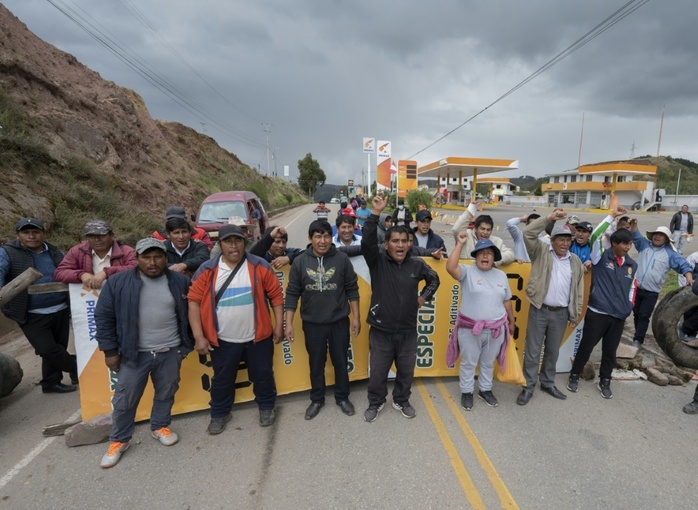The Peruvian government said Thursday that police and soldiers would soon move to dismantle roadblocks on the nation's highways erected by protesters who have demanded for weeks the resignation of President Dina Boluarte.
The move announced by the defense and interior ministries comes as shortages of basic goods including food and fuel have escalated in the South American country, with freight deliveries to the south compromised.
"The Peruvian national police, with the support of the armed forces, will unblock the national network of highways that have been the subject of a state of emergency," the ministries said in a joint statement.
Authorities said that traffic was blocked in eight of Peru's 25 regions on Thursday, which has also complicated medical treatment in some areas, with doctors unable to access needed medicines.
Protests, which broke out after the ouster and arrest in early December of former president Pedro Castillo, have repeatedly turned violent, with 46 people dying in clashes between security forces and protesters.
The government ministries said the right to protest "does not justify the obstruction of roadways" or trump the rights of people who need chemotherapy or deliveries of oxygen canisters.
It blamed the roadblocks for 10 deaths, including those of several children who did not receive medical care in time.

Castillo's ouster followed an attempt by him to dissolve congress and rule by decree, in what appeared to be a bid to avoid an impeachment vote and stave off corruption investigations.
On Thursday, protesters tossed stones and security forces responded with tear gas and rubber bullets in central Lima after hundreds had staged a march against Boluarte, who had been Castillo's vice president.
- 'Unprecedented' repression -
Earlier in the day in the mining town of Juliaca, relatives of those killed in the weeks of protests demanded justice.

"All I ask for please is justice. I am asking them for help because no one is going to bring back my brother," said a tearful Maria Samillan.
Her 31-year-old brother Marco Antonio Samillan, a doctor, was killed during protests earlier this month in the southern Andean town.
On January 9, 18 people were killed after protesters tried to storm the airport. One of the dead was a police officer burnt alive in his vehicle. Marco Antonio was shot dead while trying to save injured protesters.
"Every day I feel that I also died. I cannot live any more," said Samillan, talking via video from Juliaca at a press conference by a national rights group.
Lawyer Mar Perez accused authorities of extrajudicial killings and claimed security forces used machine guns.
"We are seeing levels of repression that are unprecedented in Peruvian democracy," Perez told AFP.
bur/bc-sst/des
© Agence France-Presse
Your content is great. However, if any of the content contained herein violates any rights of yours, including those of copyright, please contact us immediately by e-mail at media[@]kissrpr.com.
Source: Story.KISSPR.com

